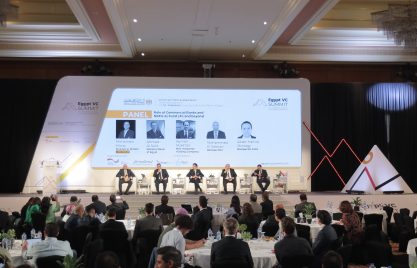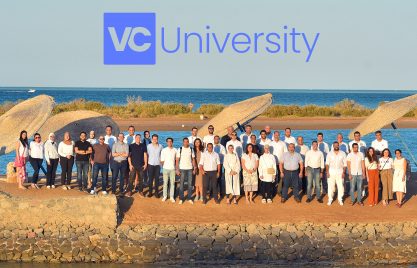Bankers, EFSA respresentatives and other financial experts gather to discuss “Non-Banking Financial Tools for Public and Private Sectors” [Guest post]
Promotion of Access to Financial Services for SMEs in Egypt (PAFSME) project sponsored a conference in cooperation with the Financial Services Institute (FSI) an affiliate of EFSA entitled “Non-Banking Financial Tools for Public and Private Sectors” in Marriott Zamalek Hotel, Cairo dated 31st May 2016. The conference tackled the non-banking financing tools that are available until now in the market. The conference shed lights on the latest legislative and regulatory developments in the field of non-traditional financing tools. The event had been attended by those who are working in that field, experts in the non-banking financial sector, leaders of the business sector, bankers as well as SMEs.
The conference consisted of two main sessions after the opening one. The first was about “Non-Banking Financial Tools for Public and Private Sectors” and the second about the “the role of the Fixed income tools in financing public and private sectors” this is in addition to 3 parallel workshops about “Sokouk, Fixed income tools and Securitization and the non-banking tools”
The conference inaugurated by Dr. Ashraf El Sharkawy “Minister of Public Sector Affairs” and Mr. Sherif Samy “EFSA’s Chairman”.
In the opening session Mr. Abdel Hamid Ibrahim mentioned some non-traditional financing tools: Securitization, Non-covered bonds, Unclassified Bonds, financial Leasing and Revenue bonds.
He stressed on the securitization and how important it is for the factoring and financial leasing as it helps in increasing the liquidity and there is almost no risk as the portfolio itself is the guarantee in addition to its benefit of decreasing the taxes. It needs an approval from the ministry of finance but it could be done through the company itself and no need to have a securitization company as a third party. For the public offering, it doesn’t have a certain percentage of the capital.
The panel of the first session defined the available financing tools which can be used to achieve the targeted economic development and associated infrastructure projects which became in deep need of financing tools that is besides bank loans to meet its financing needs in order to achieve the growth of small and medium-sized companies from private or public sectors.
Mr. Amr Lamie the chairman of SARWA capital mentioned that the pension funds invest in the governmental bonds and bank deposits, by low they can invest only 25% of the portfolio in the governmental channels so there is a big opportunity for diversified investment and increase the revenue out of this diversification. The financial gap in the market could be bridged by the non-banking financial tools as for example there will be a third party which can buy your machinery and you can keep your liquidity for other purposes.
Dr.Shahinaz Rashad the executive director of the financial services institute mentioned that 50% of the SME finance in Germany is financial leasing and 50% of this financial is equipment and cars leasing and Only 5% of the is for the real estate. The percentage in Egypt is totally different as 45 – 50% of this finance in Egypt is for the real estate. She mentioned as well that the new movable assets law will support
The discussion during the second session was about the development that occurred over two years in most of non-banking financing channels, including the capital market in terms of stocks, bonds and securitization in addition to financial leasing, real estate finance and factoring.
The conference included panel discussions about Sokouk, Fixed income tools and Securitization and the non-banking tools during three parallel workshops between representatives of companies and institutions operating in non-banking financial sector (Capital Market – Insurance – real estate Finance – financial Leasing – Factoring – microfinance) and in the presence of representatives of investment departments at banks, as well as a number of listed companies at the Egyptian Stock Exchange.
The conference emphasized on the untraditional financial tools specially the ones with the least usage as well as the areas for improvement to increase the usage of these tools to support the SMEs. The conference as well highlighted the newly issued laws and the laws in pipelines which enable the environment for SMEs.
By Nihal Hassan



